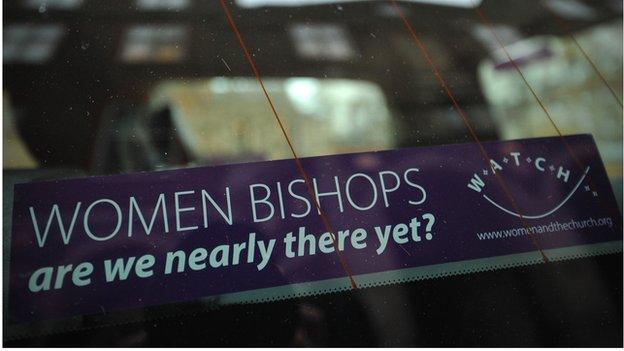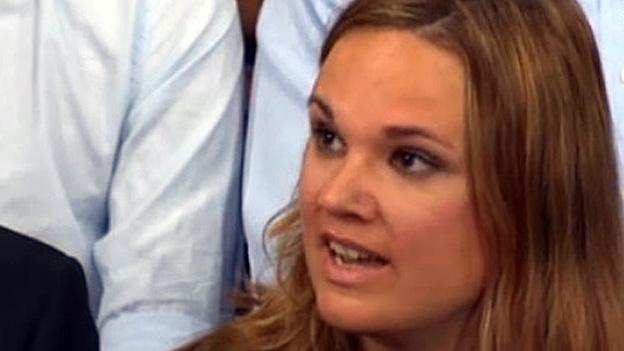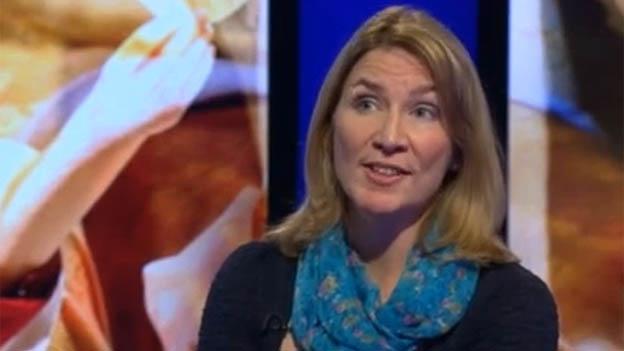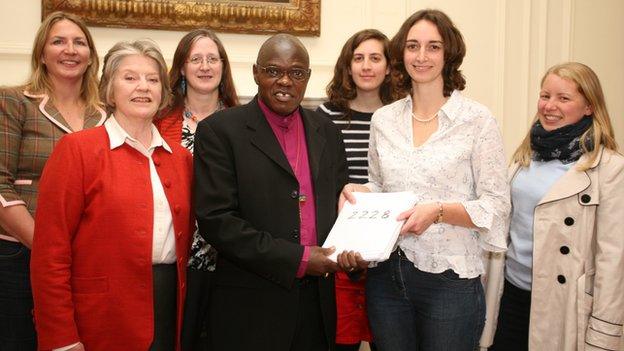Women bishops: Will trust or outrage follow key vote?
- Published

Few doubt the vote by the Church of England's ruling general synod on allowing women to be bishops on 14 July will mark a turning point for the Church.
A decision either way will cause many on the losing side to question their future in the CofE.
The proposed law seeks to avoid the long-standing deadlock over how to give opponents of women's ministry a continuing place in the Church. It relies heavily on persuading them to trust that arrangements will be made for them.
Susie Leafe, director of the conservative Evangelical group Reform, argues that "their views of how to engender that trust have been largely ignored".
But north London vicar the Rev Jody Stowell says there will be "utter outrage" if the synod rejects the legislation as it did in 2012.

Rev Jody Stowell
Vicar of St Michael and All Angels, Harrow Weald
Member of the national committee of WATCH (Women and the Church)
A founder of social media campaign group Yes2WomenBishops

In November 2012, I was huddled on a cold, dark, damp morning on the steps of Church House, Westminster. I was waiting to watch the general synod from a public gallery as history was made.
But it was not the history which some of us had been hoping for. The vote for women bishops was lost by an excruciatingly small margin.
Twenty months on, and the normally snail-paced CofE has performed an almost miraculous feat. The legislation, revised, will be set before the general synod once more.
The clear mind of the Church of England on this matter is to have women and men working together as bishops. This current legislation is very simple. However, within the principles that have been written to accompany it, there is room for those who dissent. This is a workable solution.
Equally human
The arrival of women as bishops will not instantly change either the Church or the global landscape. However, it is a marker along the way that the Church believes women and men to be equally human.
But this is the same Synod. There is a real possibility that the vote will once again be a 'No'. If this is the case, it is fair to say that the response from those in favour will be utter outrage.
Clearly, some will feel they have to give up on an institution whose structures work against what they feel is a God-given change. Some will continue to work within, remembering that nothing of value happens overnight. I will have sympathy with both.
As we make our way to synod in York, I hope it will be summer sunshine that greets us.
And this time, I hope that a different kind of history will be made.

Susie Leafe
Organiser of Proper Provision campaign calling for more safeguards for Church members opposed to women's ordination
Former women's ministry co-ordinator at Fowey parish church, Cornwall
Member of the general synod's House of Laity for Truro diocese

There is a sense of having been here before as we approach the second "final" vote on women bishops in less than two years.
Once again, the "package" does not deal with the two fundamental issues which opponents believe women cannot minister as bishops: obedience, external and sacramental assurance , external.
These need to be addressed head-on if the substantial minority is to flourish.
Once again, the minority are being called on to "trust" the majority for their future place in the Church of England but their views of how to engender that trust have been largely ignored. The token promise of the appointment of one (but just one) bishop who accepts the Evangelical insistence on male headship has not been fulfilled.
Once again, the result of the vote is likely to be close and decided by the votes of members of the House of Laity, the only House of Synod which even begins to represent the range of views of the churchgoers of the Church of England
Shift in power
However, we should note that although we have arrived at the same destination the journey has been by a different, and indeed unprecedented, route.
Behind the scenes there has been a huge shift in power.
Since, the House of Laity voted against the last Measure in 2012, it has been sidelined for coming up with the "wrong" solution. Instead, a carefully selected steering group, external (of which I was one) spent hours discussing minor details of a pre-written package that included a House of Bishops declaration that even the House of Bishops had not seen.
Sir Humphrey Appleby would have been proud.
On Monday the elected members of General Synod will finally have a chance to vote on the content of this package. My prayer is that people will have the courage to vote according to their convictions, despite the undue pressure that has been placed on some to change their mind.

Susie Leafe (left) and other members of Proper Provision campaign present petition against women bishops to the Archbishop of York.